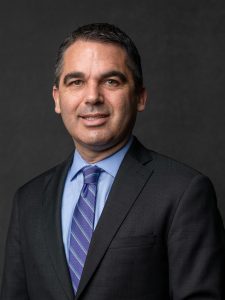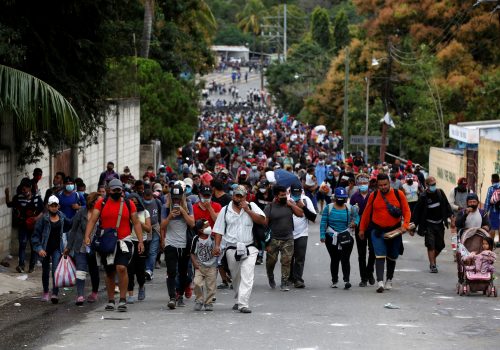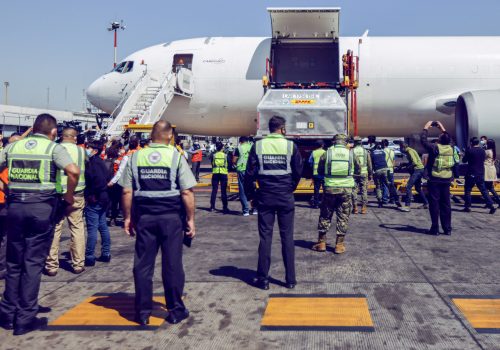Marczak testifies to the House Committee on Foreign Affairs on the new Alliance for Democratic Development
House Committee on Foreign Affairs
Subcommittee on the Western Hemisphere, Civilian Security, Migration, and International Economic Policy
Hearing on
“Costa Rica, the Dominican Republic, and Panama: A new alliance for promoting democracy and prosperity in the Americas”
January 20, 2022
Chairman Sires, Ranking Member Green, and distinguished members of the Subcommittee, it is my privilege to address you this morning on the Alliance for Democratic Development and its larger regional implications. My testimony will focus on the importance of this Alliance, how the United States can support this new effort, and the lessons that can be extrapolated for Latin America and Caribbean.
First, I congratulate the Subcommittee for prioritizing how to further strengthen regional democracy as the topic for this first hearing of 2022. Urgent action is needed to ensure that the democratic gains seen in many parts of the Americas over the last few decades are maintained.
Democracy – and the democratic institutions and norms that underpin many societies – is facing unprecedented threats from a perfect storm of existing and new challenges across Latin America and the Caribbean: inequality, social discontent, corruption, impunity, and disinformation, among them. The pandemic and its disproportionate toll on the region – home to one-third of global COVID deaths – has only exacerbated long-simmering challenges to democracy.
What is needed are new, innovative approaches that reaffirm that democracy does deliver and that it can deliver on the issues that most directly impact everyday lives. With its pragmatic, results-focused orientation, the Alliance for Democratic Development has the opportunity to do just that. The Alliance among Costa Rica, the Dominican Republic, and Panama provides a unique opportunity for three like-minded countries to informally align to fill gaps in pressing policy matters and to offer solutions rooted in the institution of democracy.
The three countries are eagerly looking to the United States as a partner in this effort, with the rest of the region also looking at how the United States will concretely help this Alliance achieve success. If the Alliance achieves its objectives with US help, the potential exists to usher in a new era of US engagement with other regional groupings. The leadership of this subcommittee as well as the work of the full committee will thus be imperative.
Importance of the Alliance for Democratic Development
Finalized on the sidelines of the 2021 UN General Assembly, the Alliance for Democratic Development was formed to address democratic backsliding, to counter the surge in regional migration, and to respond to some of the impacts of the pandemic.
With regional support for democracy having declined by 14 percentage points since 2010 (from 63 percent support to 49 percent in 2020, according to Latinobarómetro) and with the UN Economic Commission for Latin America and the Caribbean estimating that 22 million people moved into poverty in 2020, the formation of this Alliance comes at a decisive moment for the region. Importantly, it brings added legitimacy by being regionally formed but with shared alignment with US priorities and interests.
The Alliance is based on pragmatism and action rather than just vision and talk. The United States can help to advance it and similar efforts by providing additional attention and support for some of the top priorities of the Alliance that are in line with US interests.
Specific Alliance concerns range from the effects of Ortega’s rule in Nicaragua, growing instability in Haiti, and an annual seventeen-fold increase in newly arriving migrants (in the case of Panama) to the growing threats of climate change, corruption, insecurity, and a deterioration in the rule of law observed in parts of the hemisphere. With the idea that the sum is stronger than the parts, the Alliance is positioned to advocate for greater international assistance to resolve these challenges and to build stronger economies better prepared to compete in a fast-changing world.
The success of the Alliance is also a success for the United States. The leaders have extended an invitation for the United States to participate in its next meeting in March 2022, which will come six weeks after the first round of Costa Rica’s presidential election. It will be important for a high-level US official to both attend and to announce new financial and technical steps to support the goals of the Alliance. Doing so will advance a concrete partnership with a grouping that President Biden called an “inspiring commitment” in his closing remarks at the Summit for Democracy in December 2021. The March meeting will be where the rubber hits the road: where the United States shows how it can support three-like minded countries in their efforts to strengthen democracy and the actions that underpin it.
Possible US Actions to Support the Alliance for Democratic Development
The United States can be a partner for this nascent effort – and inspire other countries to either seek to join or to commit to similar principles – by working hand-in-hand with the Alliance and other regional partners to address some of the present-day issues of top concern for the Alliance.
This should begin with two foreign policy issues where forward progress is of top importance to the three countries and where resolution would positively impact US national security interests: Nicaragua and Haiti. In Nicaragua, the continued erosion of basic individual liberties under Daniel Ortega, who recently assumed a fraudulent fourth term as leader, is resulting in growing reverberations for its Central American neighbors. Migration from Nicaragua to the United States also spiked in the months leading to the November election, with over 50,000 attempting unauthorized crossings last year.
I would like to recognize the work of members of this subcommittee including that of the Chairman and Ranking Member in advancing the RENACER Act signed into law in November 2021. The RENACER Act places timely, new pressure on Daniel Ortega and those around him while reaffirming the US commitment to the Nicaraguan people. As well, the continued application of targeted US sanctions shows those abusing Nicaraguans’ rights that their day will come.
Still, the United States can do more. Section 3 of the RENACER calls for the President to review the participation of Nicaragua in the Dominican Republic-Central America FTA. The United States should lay out specific conditions to Daniel Ortega that must be complied with in order to avoid the exclusion of certain sectors of the Nicaraguan economy from DR-CAFTA. Non-compliance should result in immediate sectoral exclusion. The affected sectors should be those with the deepest ties to the Ortega regime and that are most responsible for personally enriching himself and his family and aiding his allies in government and the security forces to systematically repress the Nicaraguan people. Any trade action should not adversely affect the Nicaraguan people. In addition, other new sanctions and adjustments to current sanctions should consider the potential collateral effects to Nicaraguans, one third who already live in poverty.
The United States should also provide additional financial and technical assistance to Costa Rica and Panama as both countries face unprecedented levels of migrants from Nicaragua.
In Haiti, continued unrest, political and social instability, and unprecedented gang activity have resulted in increased threats of a spillover to neighboring Dominican Republic. As well, Haiti is quickly solidifying itself as a hotbed and transit point for illicit regional flows and as a growing source of migrants. Consistent, focused US attention to addressing Haiti’s decades-long challenges – and US leadership in advancing a like-minded international coalition – must revolve around a four-prong strategy: advancing a Haitian-led political solution; providing large-scale technical and financial assistance to quell the uptick in gang violence; investing in Haitian-led rebuilding efforts; and ensuring that corruption does not go unchecked.
Congress should instruct the US Department of State to report on steps taken to address the multi-dimensional nature of Haitian challenges and its coordination with other US departments and agencies. The report should define next steps to work with Haiti and other partner countries to improve security and peacefully carry out presidential elections.
As well, the United States should be a partner in the rebuilding of the broader Caribbean Basin. Tourism-dependent Caribbean economies contracted by nearly 10 percent in 2020. New COVID variants and the continued instability in tourism flows mean that the Caribbean must adapt to a new reality – lower tourist arrivals amid continued shocks to the market. In addition, Caribbean economies are saddled with high debt and high financing costs. The withdrawal of US correspondent banking relations (CBR) with Caribbean banks leaves fewer options to process transactions and has coincided with a global increase in Chinese CBR.
Thus, as detailed in a forthcoming Atlantic Council report, US partnership to alleviate the challenges of CBR withdrawal should begin with instructing the US Department of the Treasury to install a mechanism that standardizes compliance requirements annually, facilitates technical trainings that help respondent banks meet these requirements, and brings in a third party, autonomous institution to evaluate respondent banks’ progress in meeting banking standards.
Finally, the United States should use the various economic and development instruments at its disposal to further support Costa Rica, the Dominican Republic, and Panama in bringing economic opportunities to their people. This Alliance is a prime opportunity to show that democracy can deliver and that peoples’ lives improve when their leaders are committed to the preservation and strengthening of democratic institutions.
Among other things, the United States can support such economic improvement by giving greater flexibility for the Development Finance Corporation to operate in all three countries – and in the greater Latin America and Caribbean region overall. A statutory requirement as part of the establishment of the DFC requires the prioritization of support for low-and-middle-income countries, thus excluding all but five countries in the Americas.
This DFC requirement should be changed so that more countries in the region – and, in particular, all Caribbean countries except for Cuba, as proposed in the 116th Congress – benefit from DFC direct loans and loan guarantees, equity financing, and technical assistance.
Three additional steps should be taken. The US Department of Treasury and US Trade and Development Agency should work with industry-leading firms in the United States to identify barriers that inhibit US players from committing capital or financing projects in Alliance countries and make proposals to the relevant ministries on how to address these barriers. Congress should also consider instructing the US Trade Representative to study opportunities for harmonization between the Dominican Republic-Central America FTA and the US-Panama Trade Promotion Agreement to the benefit of participatory countries and the United States. Finally, Caribbean Basin Security Initiative funding should be increased to deepen US engagement and regional support.
In the Dominican Republic specifically, the United States should further increase its support for President Abinader’s anti-corruption efforts to build on the $7.9 million in new assistance announced by USAID Administrator Power in her October 2021 visit to the Dominican Republic.
Threats to Regional Democracy
The Alliance for Democratic Development is both a hopeful sign of new momentum to revive democracy but its establishment is also a worrisome signal that longstanding sub-regional and regional institutions are ill prepared to counter today’s threats to democracy. Polarization is increasingly threatening democratic norms in the region with disinformation and misinformation affecting how citizens’ view their current state of affairs. At the same time, COVID-19 has laid bare the inability of many governments to take care of their people at this time of great need.
As well, the pandemic has only exacerbated the discontent with government on display when mass protests swept countries such as Colombia and Chile in late 2019. COVID-19 has led to job loss in a region with over 50 percent informality, students falling behind in school, and insufficient health care systems overwhelmed by 1.5 million pandemic-related deaths.
In the early days of vaccine availability, China, as part of its broader push into the Americas and recognizing the diplomatic opportunity at hand, was quick to offer its vaccines to regional partners. In return, China sought to use this moment to further draw countries into its diplomatic and economic orbit, thus further threatening the region’s democratic gains.
A few countries of particular concern must be pointed out for their non-adherence to even the most basic democratic norms. In Venezuela, Nicolás Maduro remains entrenched in Miraflores Palace where he systematically rigs elections and throws opponents in jail. Maduro pulled out from Mexico City-hosted negotiations in September with little retribution. Nicaragua’s Daniel Ortega responded to pressure for a democratic opening by switching relations from Taiwan to China in December. And last week, the Díaz-Canel government in Cuba began mass trials with sentences of up to 30 year for those who protested last summer.
Bright spots of democracy exist. In December, Chile’s presidential vote was a model for the world in its transparency, integrity, and the offer of unity expressed by the losing candidate. Meanwhile, in Honduras, President-elect Xiomara Castro has pledged to reestablish the rule of law and root out corruption, even considering formally inviting UN help to do so. Strong Brazilian and Colombian institutions will oversee elections this year.
But the region is as divided as ever. Common ground and regional consensus on core issues to advance socioeconomic prosperity are critical for advancing democratic resilience. The pandemic has shown the futility of assuming that borders alone will protect a country. Climate change, migration, disease, and insecurity and crime know no borders. Thus, protecting democracy and ensuring popular satisfaction with democracy depends on finding common ground and forming alliances with neighbors to advance core areas of concern in the face of current and new threats.
Potential US Steps to Strengthen Democracy and Regional Democratic Institutions
This year, the United States has its best opportunity in nearly two decades to show US leadership and to put forward concrete, action-oriented proposals that unify countries in the pursuit of improving peoples’ lives. As host of the 2022 Summit of the Americas, the United States must work with partners to put forward bold, consensus-based solutions on how to revive democracy, rebuild economically and socially from the pandemic, strengthen regional health cooperation, and increase the resilience of those areas most affected by climate change. These solutions must be met with decisive actions that bring tangible benefits to households.
Other priorities should include a presidential visit to the region prior to hosting the Summit and additional trips by high-level US officials. Vice President Harris, in particular given her Jamaican heritage, has an opportunity to highlight a new commitment to the Caribbean through a trip that would also address some of the most pressing issues for the Caribbean Community: tourism-related job loss, high debt burdens, and, of course, energy and climate security.
An Atlantic Council report last year – with a foreword by Chairman Sires – proposed a partnership strategy to help the region recover and rebuild stronger from COVID. As the lead author, I wrote that a US regional strategy should seek to accomplish three goals: increase prosperity; improve security; and strengthen democracies. To achieve these goals, a six-point plan was laid out focusing on the following pillars: 1) investing in health; 2) revitalizing economies as a means to also address corruption and build resilience; 3) boosting hemispheric commerce through integration, infrastructure, and technology – and the opportunities of nearshoring; 4) addressing climate action by implementing commitments and integrating policies; 5) improving education as a pillar for growth and social inclusion; and 6) bolstering democracy and governance.
The plan highlighted the potential role of civil society, municipal leaders, the private sector, and national-level governments to work with the United States in each of these pillars. These six pillars continue to provide the framework by which the United States can partner with regional democracies in areas of mutual interest.
Overall, to support regional democracies, the United States must meet countries where there is the greatest need and overlap with US interests. Unlike a decade ago, the United States is no longer the only non-regional partner with significant Latin American and Caribbean interests. China has established itself as the top trade partner of Brazil, Chile, Peru, and Uruguay with total regional trade reaching $315 billion in 2020. Chinese loans and investments do not come with anti-corruption clauses or other mechanisms to strengthen the rule of law fundamental to democracies.
In sum, the Alliance for Democratic Development is a welcome effort at a time of great concern about the future direction of the region. As neighbors, the United States’ own national interests are intertwined with the bolstering of democracy in the Americas. The year 2022 must be one where decisive action is taken to reinforce our hemisphere’s democratic institutions through a partnership-based strategy that aligns regional priorities and US interests.
Thank you, once again, for the opportunity to appear before the Subcommittee today. I look forward to answering your questions.
“As host of the 2022 Summit of the Americas, the United States must work with partners to put forward bold, consensus-based solutions on how to revive democracy, rebuild economically and socially from the pandemic, strengthen regional health cooperation, and increase the resilience of those areas most affected by climate change. These solutions must be met with decisive actions that bring tangible benefits to households.”
Related content

The Adrienne Arsht Latin America Center broadens understanding of regional transformations and delivers constructive, results-oriented solutions to inform how the public and private sectors can advance hemispheric prosperity.



